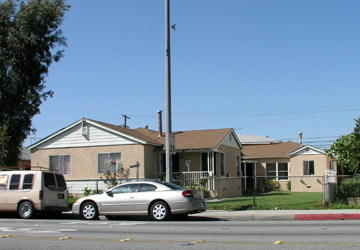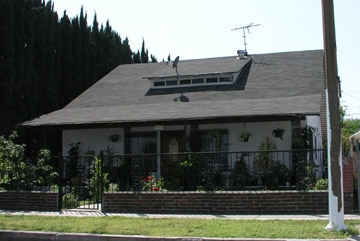The Fewkes’ lived in the back house, at 5941 Gage —

and it was here where Dolores lived her life, dreamed her dreams, and let her heart beat for a budding existentialist who had issues with Christianity and women. A potent combo. “In the last five years my mother’s attitude toward me changed,” said Welch. “There wasn’t the same kind of affection as there used to be. And the church didn’t live up to what it was supposed to.” Who wouldn’t adopt what the papers called “the immature philosophy of pessimism?”
Maybe part of his escape to Horse Flats had to do with feeling confined in this newly-dense urban environment. The likes of Huntington Park, Walnut Park, Bell Gardens and South Gate had been, just previous to his birth, endless acres of grazing sheep and cauliflower fields (Amelia Earhart learned to fly in one such South Gate expanse of dirt). In the early 20s cities were incorporated, every inch was parceled out, and frame buildings went up like mad.
Welch lived in this one, at 7501 Whitsett:

And it was here, during his post-Navy freakout, he argued religion, thought his dark thoughts, and formulated a philosophy based on a common youthful misreading of Schopenhauer (seemingly endemic to the postwar geist).
Like get hip. Murder-suicide is no answer in an absurd vacuum, dad.
-Kim, 1947project